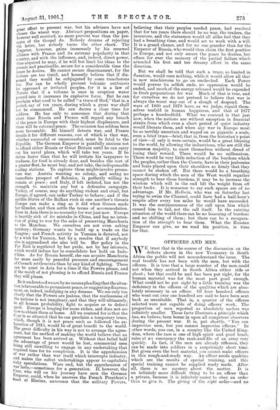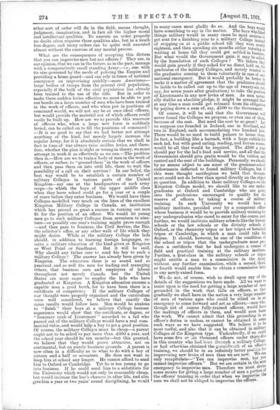OFFICERS AND MEN.
WE trust that in the course of the discussion on the defects shown in the new Yeomanry in South Africa the public will not misunderstand the issue. The real trouble has not been with the men, but with the officers. It is true that a large number of the men could not when they arrived in South Africa either ride or shoot ; but that could be and has been put right, for the human material was for the most part good enough. What could. not be put right by a little training was the deficiency in the officers of the qualities which are abso- lutely necessary in an officer. Of four hundred officers who went out over one hundred are said to have been sent back as unsuitable. That is, a quarter of the officers selected were not capable of doing officers' work. The proportion of men reported as absolutely useless was infinitely smaller. These facts illustrate a principle which has, we believe, been borne in upon all competent observers during the present war. It is, put shortly, " You can improvise men, but you cannot improvise officers." In other words, you can, in a country like the United King- dom, where the race is one of high spirit and good heart, raise at an emergency the rauk-and-file of an army very quickly. In fact, if the men are already riflemen, they can be made into soldiers in a surprisingly sbort time. But given even the best material, you cannot make officers in this rough-and-ready way. An officer needs qualities which are the results of special training, and this special training cannot be supplied ready made. After all, there is no mystery about the matter. It is an infinitely more difficult thing to be an officer than a private, because it is infinitely easier to obey an order than to give it. The giving of the right order—and no other sort of order will do in the field, means thought, judgment, imagination, and in fact all the higher moral and intellectual qualities. To execute an order properly no doubt often requires these qualities also, but in a much less degree, and many orders can be quite well executed almost without the exercise of any mental process.
What are the consequences of accepting this dictum that you can improvise men but not officers ? They are, in our opinion, that we can in the future, as in the past, manage with a comparatively small standing Army—i.e., one with its size governed by the needs of policing the Empire and providing a. home guard—and can rely in times of national emergency on improvising quickly—more Americano- large bodies of troops from the general civil population, especially if the bulk of the civil population has already been trained to the use of the rifle. But in order to make these sudden levies effective we must be able to put our hands on a large number of men who have been trained in the work of officers, and who when put in positions of command would, we will not say be at once ideal officers, but would provide the material out of which officers could easily be built up. How are we to provide this reservoir of officers who, when a large new force is suddenly levied, can be called on to fill the positions of command ? —It is no good to say that we had better not attempt anything of the kind, but' merely largely increase the regular Army, for it is absolutely certain that we shall in fact in time of war always raise sudden levies, and there- fore, whether the plan is right or wrong in theory, we must attempt to work it as effectively as we can.—The problem then is,—How are we to train a body of men in the work of officers, or rather, to "ground them" in the work of officers and then pass them on into civil life, there to wait the possibility of a call on their services ? In our belief, the best way would be to establish a certain number of military Colleges in various parts of the United Kingdom—say one at the headquarters of each army corps—to which the boys of the upper middle class when they leave school could go for a year or a couple of years before they enter business. We would have these Colleges modelled very much on the lines of the excellent Kingston Military College in Canada, an institution which has proved so great a success in turning out men fit for the position of an officer. We would let young men go to such military Colleges from seventeen to nine- teen—or possibly one year's training might prove enough —and then pass to business, the Civil Service, the Bar, the solicitor's office, or any other walk of life which they might desire. While at the military College the lads should, in addition to learning foreign languages, re- ceive a military education of the kind given at Kingston or West Point or Sandhurst. But it will be said, Why should any father care to send his boy to such a military College ? The answer has already been given by Kingston. The education there is so sound and so practical, and so well fits men for leading and managing others, that business men and employers of labour throughout not merely Canada but the United States are most eager to employ the lads who have graduated at Kingston. A Kingston education ensures a capable man a good berth, for to have been there is a certificate of competency._ If the military Colleges of our thought were properly organised and the curriculum were well considered, we believe that exactly the same results would follow here. Men would be anxious to " finish " their boys at a military College because experience would show that the certificate, or degree, or " honorary rank of Lieutenant " accorded to a lad who passed out of the military College would have a real com- mercial value, and would help a boy to get a good position. Of course, the military Colleges mast be cheap—a parent ought not to be asked to pay more than £100 a year, and the school year should be ten months—but this granted, we believe that they would prove attractive, not on sentimental, but on purely business grounds. A parent is now often in a difficulty as to what to do with a boy of sixteen and a half or seventeen. He does not want to keep him at school any longer. He cannot afford to send him to Oxford or Cambridge. Yet he is too young to go into business. If he could send him to a substitute for the University which would not only be reasonably cheap, but would increase the boy's chances in after life, and also give him a year or two years' sound disciplining, he would in many cases most gladly do so. And the boys week have something to say in the matter. The boys win:allied things military would in many cases be most anxious to get sent for a finishing year to a military College instead of stopping on at a public school till they were nearly eighteen, and then spending six months either tutoring or waiting at home till they could get settled in b But what would the Government gain, it may be asked, by the foundation of such Colleges ? We believe they would gain greatly if they asked for no direct hold on the graduates of the military Colleges, and merely trusted to the graduates coming to them voluntarily in case of any national emergency. But it would probably be better to make it a matter of agreement that the graduates should be liable to be called out up to the age of twenty-six (or, say, for seven years after graduation) to take the position of Lieutenants in any new levies of men. As men natur. ally dislike an absolute pledge, it might be arranged that at any time a man could get released from his obligation by paying down a sum of, say, £100 to the Government.
Of course, it will be said that the Government wii never found the Colleges we propose, or even one of them, because of the cost. But need the cost be so great? Let us suppose one founded in Ireland, one in Scotland, and two in England, each accommodating two hundred lads. There would be no need to build palaces to house them. In fact, a building like a barrack, with a large cubicle for each lad, but with good eating, reading, and lecture rooms, would be all that would be required. The £100 a year should pay for the lad's food and service, and all that the Government should give gratis would be the tuition and control and the rent of the buildings. Personally, we should by no means object to see some of the grammar-school endowments deflected to found military Colleges, but if this were thought sacrilegious we hold that Govern- ment could not do better than spend directly on the object in question. In addition to these military Colleges on the Kingston College model, we should like to see under- graduates at Oxford and Cambridge who are going into the professions encouraged to qualify for the reserve of officers by taking a course of military training. In each University we would have a military institute, presided over by a competent officer whose business it would be to provide military training for any undergraduates who cared to enter for the course, and, further, we would institute military schools like the history schools or the law schools or the divinity schools at Oxford, or the, chemistry tripos or law tripos or botanical tripos at Cambridge, in which a man could take his degree. It should, however, be one of the conditions of the school or tripos that the undergraduate must pro. duce a certificate that he had undergone a course of field and practical training at the military institute. Further, a first-class in the military schools or tripos might entitle a man to a commission in the Army without any further examination, while a second, third. or fourth would enable him to obtain a commission later in any newly-raised force.
We do not, of course, wish to dwell upon any of the details of the suggestions we have made. All we want to insist upon is the need for getting a large number of men grounded ;in the work that falls on officers, so that gradually we shall have in the nation a very large number of men of various ages who could be relied on in an ernergency_to' come forward and act as officers,—men who, though not of course fully-trained officers, _would have the makings of officers in them, and would soon learn the work. We cannot admit that this grounding in au officer's duties is useless, or cannot be obtained in some such ways as we have suggested. We believe it to be most useful, and also that it can be obtained in militan' Colleges of the Kingston type.. Undoubtedly, if we could have some five or six thousand officers under thirty-five in this country who bad been through a military College. or had otherwise obtained the gromadwork of an officers training, we should be in an infinitely better position for improvising new levies of men than we are now. We can only recapitulate—" You can improvise men, but you cannot improvise officers." But we are certain in the nest emergency to improvise men. Therefore we must devise. some means for giving a large number of men a portion of the officers' training in order that when we improvise ta6 men we shall not be obliged to improvise the officers.



































 Previous page
Previous page